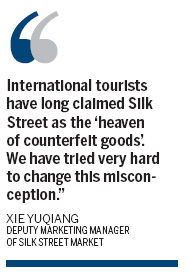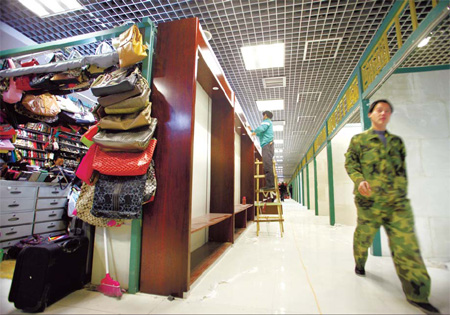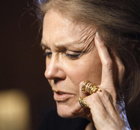Money
Silk Street renovated to get rid of phony goods
By Shi Jing (China Daily)
Updated: 2010-03-19 08:06
 |
Large Medium Small |
|
Part of the Silk Market has recently completed a 10-million-yuan renovation project. ZOU HONG / CHINA DAILY |
Beijing's Silk Street market, a popular shopping destination for international tourists, will reopen fully on Friday following a five-day renovation period that aimed to drive out fake goods.
A total of 414 stalls have undergone renovation, equating to about one third of all the stalls. The market operator, Beijing Silk Street Company, invested about 10 million yuan in the work, most of which was used for decoration and lease return.
The renovation began on March 14 and concluded on Thursday. To compensate trader losses during the five days, market operators intend to return lease charges to vendors of approximately 1,000 yuan per stall, based on the monthly rent.

The market embarked on the renovation project this March since most stallholder lease contracts are up for renewal on Friday. The renovation work doubles the floor space of only half the number of stalls, with the remaining stalls asked to vacate.
"The stalls on this floor have been cut down by half, leaving 30 now. We drew lots to decide who would go and who could stay. It was kind of cruel but we had no choice," said a vendor selling suitcases on the first basement of the market.
"Although I was lucky to stay here, the position of my stall is not great," added the vendor.
But Xie Yuqiang, deputy marketing manager of the market, said drawing lots was the fairest solution.
"Nobody can be blamed when the decision is made by the vendors themselves. It can also avoid bribery and any other illicit means to win the stall," he said.
With the expansion plan running alongside a continued effort to remove counterfeit goods, the public has argued that Silk Street is no longer "Silk Street".
However, Xie said their actions were intentional.
"International tourists have long claimed Silk Street as the 'heaven of counterfeit goods'. We have tried very hard to change this misconception," said Xie.
Earlier this year, METRO interviewed Hu Wenli, deputy general manager of Silk Street, who said, "After the changes, 70 percent of the market's goods will be 'safe products' ".
But despite the fresh coat of paint, METRO found on Thursday numerous counterfeit goods still on sale.
Xie, however, remains adamant that change is on the way.
"With the renovation work completed, the focus of Silk Street will be custom-made clothes with Chinese characteristics, which are very popular among foreigners. The market will later cater to other high-end customers," added Xie.
Silk Street market is also promoting its own private brand to attract international customers, Xie said.
"We released our own brand 'Silk Street' on Jan 23, 2008. This means all products stamped with a 'Silk Street' logo are exclusive to the market. Currently, more than 100 stalls sell these goods, including tea, ceramics and pearls," he said.








